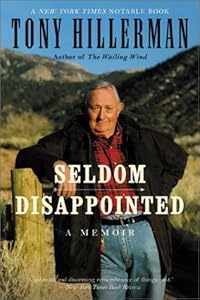Last night I finally got into the section of Tony Hillerman's memoir Seldom Disappointed that drew me to this book in the first place: his move to New Mexico and his gradual transition from ordinary schmo to writer.
In the third quarter of his memoir, Hillerman goes to college and majors in journalism, cycles through several Oklahoma papers before being recruited by the news service United Press. UP sends him off to the Santa Fe bureau, where the stories he dictates over the phone are transcribed directly to teletype for distribution to subscribers. When UP decides to have him split his time between Santa Fe (the capitol city) and Albuquerque (the only metropolitan center of any size) an hour away, Hillerman quits UP and enrolls at the University of New Mexico, where he is immediately drafted as an assistant to the President of the University. His job at UNM is to help the President deal with the press, and, occasionally, the same political figures in Santa Fe Hillerman had just left.
Hillerman's understated style in this section is at its best: he manages to capture the old-boy-network Third-World aspect of New Mexico in the Fifties deftly and economically, and he even captures the magical-realism of the Cricket Coogler murder and its implications without losing his own distinctive reporterly voice.
Hillerman makes the transition from graduate student to UNM faculty and from state politics to university faculty politics, adopts several children, and begins to make the transition from academic to writer; at the end of this section he's beginning to discuss but not actually write the first of his Navajo Country novels and has sketched sections from a couple of others. It's hard to fathom that with a quarter of the book to go he still has forty years to live and more than fifteen books to write.
This is the section of the book that actually seems joyful and amused at how well his life is turning out, and at the risk of falling back on cliche I have to say it's a joy to read. Hillerman's novels sometimes plod and are generally underimagined, and even he understands he's a man of limited talent as a fiction writer (he has trouble with believable villains, struggles with romance, etc.) but as an essayist (The Great Taos Bank Robbery) and a memoirist he's much better, even with his deadpan delivery and lean prose.
If everything goes well I'll wrap this book up tonight; I'm looking forward to reading the rest of it, but not looking forward to being done.
exercises in compound storytelling
Subscribe to:
Post Comments (Atom)

![Reblog this post [with Zemanta]](http://img.zemanta.com/reblog_c.png?x-id=d11ada3b-c8d4-4cba-ba47-711e6f90834c)

No comments:
Post a Comment